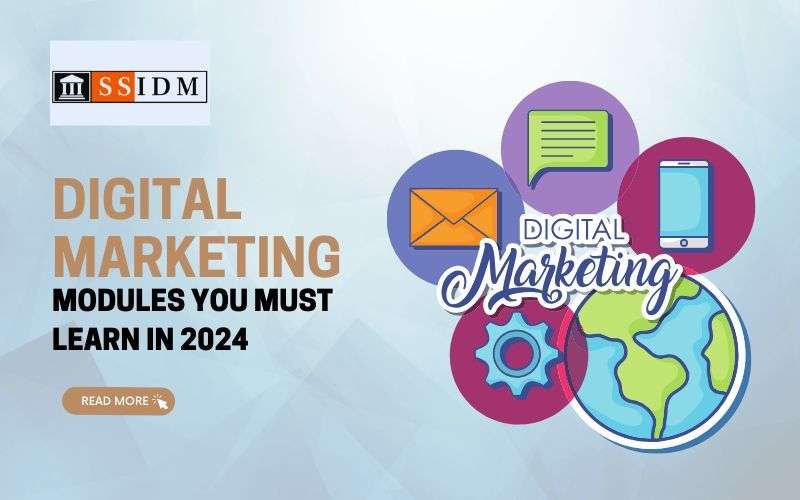Digital Marketing Modules You Must Learn in 2024

In today’s rapidly evolving digital landscape, staying ahead of the curve requires mastering a diverse set of digital marketing skills. As the demand for skilled digital marketers continues to grow, selecting the right modules to learn is crucial for your career development. SSIDM, recognized as the best institute for digital marketing with placement, offers a comprehensive curriculum designed to equip you with the expertise needed to excel in the industry. This guide explores the essential digital marketing modules you must learn in 2024 to thrive in the competitive market.
1. Search Engine Optimization (SEO)
What is SEO?
Search Engine Optimization (SEO) is the process of optimizing your website to rank higher on search engine results pages (SERPs). It involves various techniques to improve your website’s visibility, attract organic traffic, and enhance user experience.
Why Learn SEO?
SEO is fundamental to digital marketing. Understanding how search engines work and how to optimize content for search engines can significantly impact your online presence. Mastering SEO techniques will help you drive more organic traffic to your website, increase brand visibility, and boost conversions.
Key Components of SEO
- Keyword Research: Identifying the right keywords to target is the foundation of SEO. Tools like Google Keyword Planner, Ahrefs, and SEMrush can help you find relevant keywords with high search volume and low competition.
- On-Page SEO: This involves optimizing individual web pages to rank higher. It includes meta tags, headers, URL structure, and content optimization.
- Off-Page SEO: Building backlinks from reputable websites, social media marketing, and influencer outreach are crucial for improving your site’s authority.
- Technical SEO: Ensuring your website is technically sound, including site speed, mobile-friendliness, and structured data, is essential for better search engine rankings.

2. Pay-Per-Click Advertising (PPC)
What is PPC?
Pay-Per-Click (PPC) advertising is a model where advertisers pay a fee each time their ad is clicked. It is a way to buy visits to your site rather than earning them organically. Google Ads is the most popular platform for PPC campaigns.
Why Learn PPC?
PPC campaigns can generate immediate traffic and leads. Learning PPC will enable you to create targeted ad campaigns, manage budgets effectively, and achieve a high return on investment (ROI).
Key Components of PPC
- Campaign Structure: Understanding how to organize campaigns, ad groups, and keywords is crucial for PPC success.
- Ad Copywriting: Crafting compelling ad copy that attracts clicks and converts leads.
- Bid Management: Learning how to set and adjust bids to maximize ROI.
- Analytics and Reporting: Using tools like Google Analytics to track performance and make data-driven decisions.

3. Social Media Marketing
What is Social Media Marketing?
Social media marketing involves using social media platforms to promote products, services, or brands. It includes creating content, engaging with followers, and running paid advertising campaigns.
Why Learn Social Media Marketing?
With billions of users on social media platforms, social media marketing is essential for reaching a wide audience. It allows you to engage with customers, build brand loyalty, and drive traffic to your website.
Key Components of Social Media Marketing
- Content Creation: Developing engaging content that resonates with your target audience.
- Platform Strategy: Understanding the nuances of different social media platforms (e.g., Facebook, Instagram, LinkedIn) and tailoring strategies accordingly.
- Community Management: Engaging with followers, responding to comments, and managing online reputation.
- Paid Advertising: Running targeted ad campaigns to reach specific demographics and achieve marketing goals.

4. Content Marketing
What is Content Marketing?
Content marketing involves creating and distributing valuable, relevant, and consistent content to attract and retain a clearly defined audience. It aims to drive profitable customer action.
Why Learn Content Marketing?
Content is at the heart of digital marketing. Effective content marketing can help you build brand authority, attract organic traffic, and nurture leads through the sales funnel.
Key Components of Content Marketing
- Content Strategy: Planning and developing a content calendar that aligns with your marketing goals.
- SEO Writing: Creating content optimized for search engines to increase visibility and drive organic traffic.
- Content Distribution: Using various channels, such as blogs, social media, and email marketing, to distribute content.
- Performance Analysis: Measuring the effectiveness of content using analytics tools and adjusting strategies accordingly.
5. Email Marketing
What is Email Marketing?
Email marketing involves sending targeted emails to a list of subscribers to promote products, services, or content. It is a powerful tool for building relationships with customers and driving conversions.
Why Learn Email Marketing?
Email marketing offers a high ROI and is an effective way to nurture leads and keep your audience engaged. It allows for personalized communication and targeted messaging.
Key Components of Email Marketing
- List Building: Growing and managing your email list to ensure you have a targeted audience.
- Campaign Design: Creating visually appealing and responsive email campaigns.
- Segmentation and Personalization: Tailoring messages based on subscriber behavior and preferences.
- Analytics and Optimization: Tracking open rates, click-through rates, and conversions to optimize future campaigns.

6. Analytics and Data-Driven Marketing
What is Analytics and Data-Driven Marketing?
Analytics involves collecting, analyzing, and interpreting data to make informed marketing decisions. Data-driven marketing uses insights gained from data to optimize marketing strategies and improve ROI.
Why Learn Analytics and Data-Driven Marketing?
Understanding analytics is crucial for measuring the success of your marketing efforts. It helps you identify what works, what doesn’t, and how to improve your strategies.
Key Components of Analytics and Data-Driven Marketing
- Web Analytics: Using tools like Google Analytics to track website performance and user behavior.
- Data Interpretation: Analyzing data to uncover trends, patterns, and insights.
- A/B Testing: Running experiments to test different marketing strategies and identify the most effective ones.
- Reporting: Creating detailed reports to communicate findings and inform decision-making.
7. Affiliate Marketing
What is Affiliate Marketing?
Affiliate marketing involves partnering with affiliates who promote your products or services in exchange for a commission on sales generated through their efforts.
Why Learn Affiliate Marketing?
Affiliate marketing can expand your reach and increase sales with minimal upfront investment. Learning how to manage and optimize affiliate programs can drive significant revenue.
Key Components of Affiliate Marketing
- Affiliate Recruitment: Finding and partnering with affiliates who align with your brand.
- Program Management: Setting up and managing affiliate programs, including tracking and payments.
- Performance Tracking: Monitoring affiliate performance and optimizing strategies for better results.
- Compliance: Ensuring all affiliate activities comply with legal and ethical standards.
Why SSIDM is the Best Place for You
Choosing the right institute to learn digital marketing is crucial for your career growth. SSIDM stands out as the best institute for digital marketing with placement for several reasons:
Expert Faculty
SSIDM boasts a team of industry experts with years of experience in digital marketing. Our instructors are not just teachers but practitioners who bring real-world insights and practical knowledge to the classroom.
Comprehensive Curriculum
Our curriculum is designed to cover all essential digital marketing modules, ensuring you gain a holistic understanding of the field. From SEO to analytics, our courses are updated regularly to keep pace with industry trends and best practices.
Hands-On Learning
At SSIDM, we believe in learning by doing. Our courses include practical assignments, live projects, and case studies that provide hands-on experience. This approach helps you apply theoretical knowledge to real-world scenarios.
Placement Assistance
We take pride in our strong industry connections and placement support. SSIDM provides dedicated placement assistance to help you land your dream job in digital marketing. Our placement cell works tirelessly to connect you with top companies and job opportunities.
State-of-the-Art Infrastructure
Our institute is equipped with modern infrastructure, including well-equipped labs, high-speed internet, and access to the latest digital marketing tools and software. This ensures a conducive learning environment.
Personalized Mentorship
SSIDM offers personalized mentorship to guide you throughout your learning journey. Our mentors provide one-on-one support, career advice, and help you navigate the complexities of digital marketing.
Strong Alumni Network
Joining SSIDM means becoming part of a vibrant alumni network. Our alumni are working in top companies across the globe, and this network can provide valuable connections and opportunities for your career growth.
Conclusion
Mastering these digital marketing modules is essential for anyone looking to build a successful career in digital marketing. At SSIDM, the best institute for digital marketing with placement, we offer comprehensive courses that cover all these modules and more. Our curriculum is designed to equip you with the skills and knowledge needed to excel in the ever-evolving digital landscape. Enroll today and take the first step towards a thriving career in digital marketing.
By learning these modules, you’ll be well-prepared to navigate the complexities of digital marketing and achieve your professional goals. Whether you’re a beginner or looking to enhance your existing skills, SSIDM provides the perfect platform to advance your career. Join us and become a digital marketing expert in 2024 and beyond.







